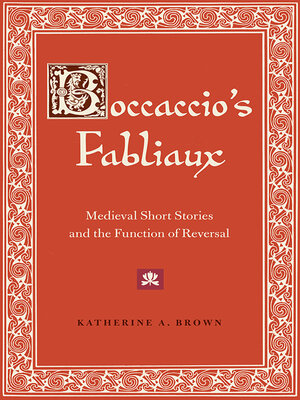Boccaccio's Fabliaux
ebook ∣ Medieval Short Stories and the Function of Reversal
By Katherine A. Brown

Sign up to save your library
With an OverDrive account, you can save your favorite libraries for at-a-glance information about availability. Find out more about OverDrive accounts.
Find this title in Libby, the library reading app by OverDrive.



Search for a digital library with this title
Title found at these libraries:
| Library Name | Distance |
|---|---|
| Loading... |
Short works known for their humor and ribaldry, the fabliaux were comic or satirical tales told by wandering minstrels in medieval France. Although the fabliaux are widely acknowledged as inspiring Giovanni Boccaccio's masterpiece, the Decameron, this theory has never been substantiated beyond perceived commonalities in length and theme. This new and provocative interpretation examines the formal similarities between the Decameron's tales of wit, wisdom, and practical jokes and the popular thirteenth-century fabliaux.
Katherine Brown examines these works through a prism of reversal and chiasmus to show that Boccaccio was not only inspired by the content of the fabliaux but also by their fundamental design—where a passage of truth could be read as a lie or a tale of life as a tale of death. Brown reveals close resemblances in rhetoric, literary models, and narrative structure to demonstrate how the Old French manuscripts of the fabliaux were adapted in the organization of the Decameron.
Identifying specific examples of fabliaux transformed by Boccaccio for his classic Decameron, Brown shows how Boccaccio refashioned borrowed literary themes and devices, playing with endless possibilities of literary creation through manipulations of his model texts.







